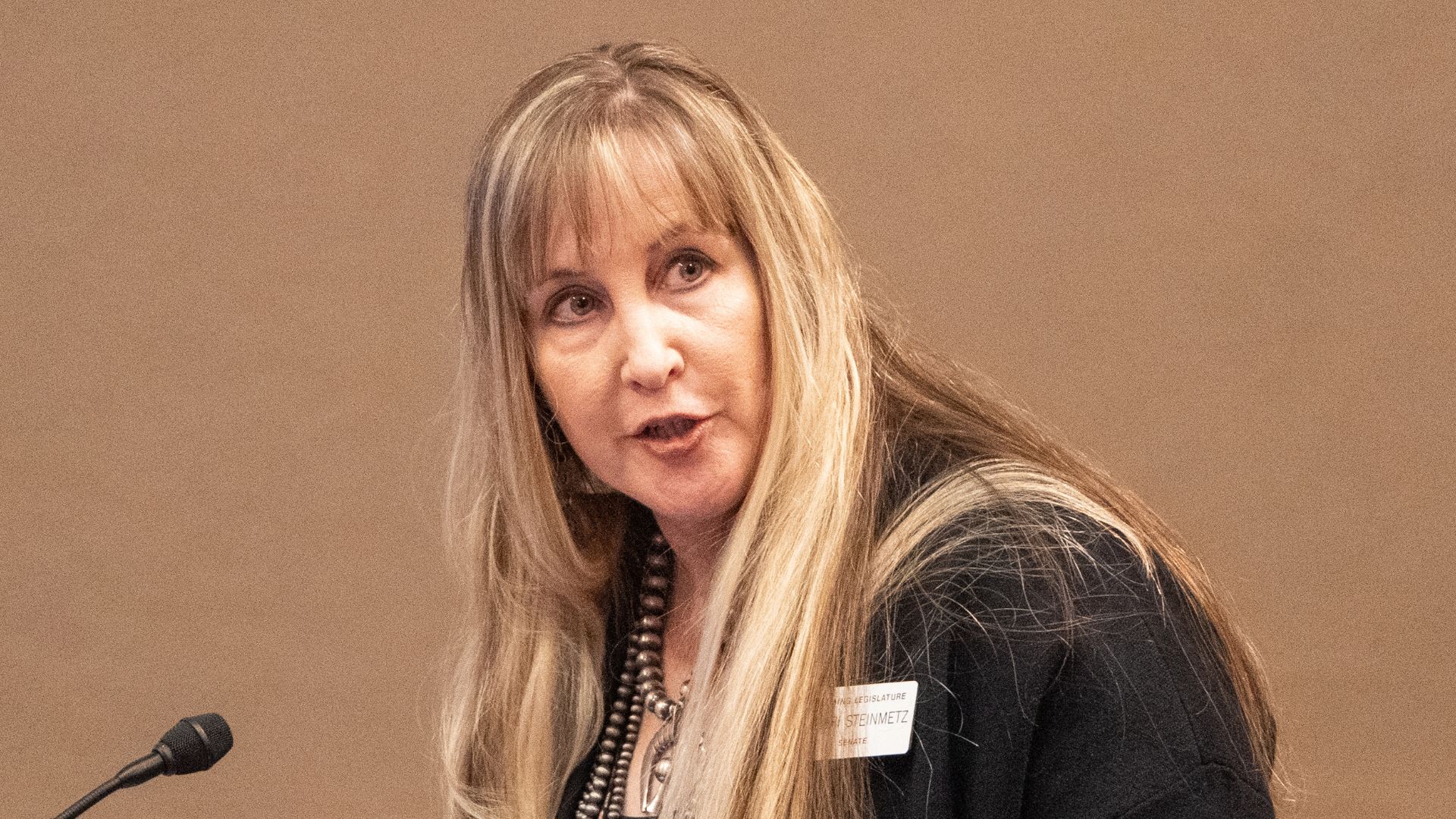Senate committee: No DEI programs at UW, community colleges

Senator Cheri Steinmetz, R-Lingle, speaks during the morning session of the 68th Wyoming Legislature January 17, 2025 in the Senate Chambers. Photo by Michael Smith
CHEYENNE — A Senate committee passed its own anti-diversity, equity and inclusion bill in the statehouse Thursday.
In a 5-0 vote, the Senate Agriculture, State and Public Lands and Water Resources Committee approved Senate File 103, “Terminating and defunding diversity, equity and inclusion.”
One of the bill’s primary sponsors, Sen. Cheri Steinmetz, R-Torrington, told the committee that for four years, several senators have been “working through budget amendments to try to accomplish something similar to” SF 103, which she called “a little bit more expensive than what we have been doing.”
In 2022, lawmakers discussed restricting funding to the University of Wyoming’s Gender and Women’s Studies Department and, in 2024, brought budget amendments penalizing the University of Wyoming’s medical residency program for offering gender-affirming care.
SF 103 prohibits DEI efforts and mandates by state agencies and educational institutions in Wyoming, placing limitations on how state funding in such institutions can be used, according to Steinmetz. Further, she told the committee that on Jan. 22, President Donald Trump took action through an executive order to “terminate radical DEI preferencing in a myriad of ways.”
SF 103 does the same on a state level.
Primarily aimed at University of Wyoming coursework, Steinmetz pointed out that “embedded in the core courses” of many degree programs at University of Wyoming is coursework in diversity, with the following objectives: “Examine the meaning, including causes and effects of racism, sexism, and other forms of bias. Explore one’s own personal response to those forms of bias.”
Steinmetz said that rather than DEI coursework, she preferred “racially neutral, or color blind laws.”
SF 103 would not preclude the teaching of history like American slavery, Indian removal or the Holocaust.
“We are not perfect, and we have a history. We need to be able to talk about that,” Steinmetz said.
What’s next?
Senate File 103, “Terminating and defunding diversity, equity and inclusion,” will head to the Senate floor for discussion.
Freshman Sen. Laura Taliaferro Pearson, R-Kemmerer, thanked Steinmetz for bringing forward SF 103.
“When children are coming home from school and saying that they wished they weren’t white — based on what they are learning in the education system — that is a problem for me. We have to put some sort of parameters in place to protect the children,” Pearson said.
Public comment: accreditation standards, messaging to girls
Erin Taylor, executive director of the Wyoming Community College Commission, said her organization didn’t have a position on the legislation but did have questions. She asked how it could limit private donations and may affect certain coursework.
“A few of the words that are used here … like implicit bias, conscious bias, cultural competence, those are concepts that are taught in general psychology and sociology courses, so we are just wondering how far we go with including everything in there,” Taylor said.
Brandon Kosine, interim president of Casper College, asked if an exception could be included for human services majors.
“The reason I am asking for that is I have a Ph.D. in counseling. We have accreditation standards that cover a lot of issues about income disparity, racial issues,” Kosine said. “It is actually in the standards, and it is written in the standards for undergraduate education like social work, psychology and counseling.”
Pearson said she believed the legislation allowed for that study as written.
University of Wyoming Vice President of Governmental Affairs and Community Engagement Mike Smith told the committee that after budget amendments and proposed legislation in past years, the university has worked hard to meet the intent of the Legislature, from closing the UW Office of Multicultural Affairs to not expending any state funding on DEI programs.
“We are well on our way to fully implementing that directive,” Smith said.
Steinmetz said she would work with the community colleges and university to answer any questions, although earlier in the meeting, she cautioned that simple name changes of agencies would not be enough.
Northern Arapaho Business Council councilman Keenan Groesbeck and legal counsel for the Northern Arapaho Tribe Clare Johnson approached the committee to ask how the legislation might affect their membership.
“We’ve seen within this bill that it talks about sex, color, race and ethnicity,” Johnson said. “We would like clarification from the author if Native Americans are included in any of those categories.”
Brad Tyndall, Central Wyoming College president, asked similar questions, saying that CWC is a non-tribal institution that serves a primarily Native American population.
“We require that all our employees — because we have such a great percentage of Native American students and staff — take a training on what we call Wind River Basics. It is three one-hour seminars because it is important to understand your clientele. It is learning history and culture of the tribes so we can better serve them.”
Further, CWC offers degrees and certificates in that area.
Micah Richardson, associate director of policy at the Wyoming Women’s Foundation, cited concerns with the vagueness of the bill and with its administrative process. As SF 103 includes women’s studies coursework as DEI programming, Richardson said she wondered what that might say to girls across Wyoming.
“On paper, it implies, sure, you can take a women’s studies course. But it is not important enough to prioritize,” Richardson said. Sen. Tim French, R-Powell, said he disagreed.
“I would just mention, everybody in here truly cherishes our girls. I have a daughter, two granddaughters. We cherish the girls in our society, just so you know,” French replied.
This story was published on January 31, 2025.








